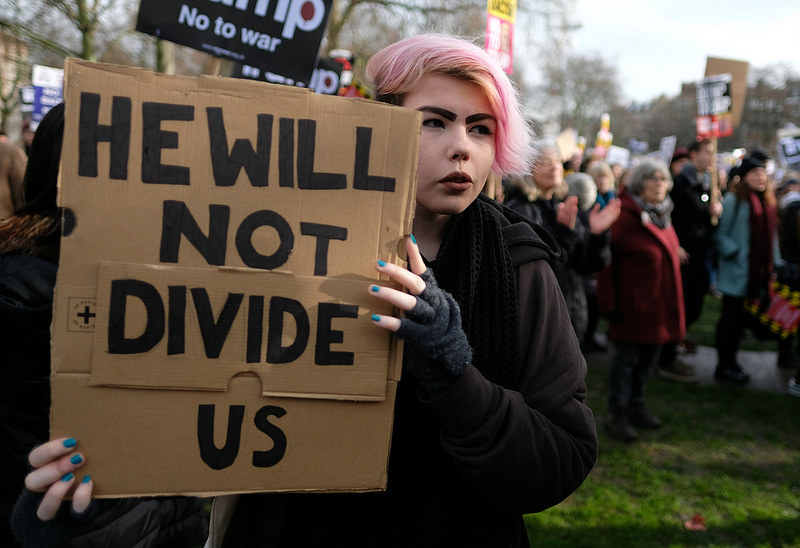Why Won't Trump Unequivocally Condemn the Charlottesville Nazis?
The president's inability to unequivocally condemn may be rooted in his general love of illiberal exclusionism
President Donald Trump showed during a press event today, ostensibly to announce some plans to ease permitting processes for infrastructure building, that he can't help himself from exhibiting sympathy with the crowds who gathered in Charlottesville this weekend to march for white supremacy.

It is shocking, on one level, to find a U.S. president unwilling to unequivocally and with any sense that he actually believes what he's saying decry people marching under fascist emblems and shouting Nazi slogans (or in happy open alliance with those doing so, for the pedantic), one who considers it more important that you know in the same breath that he also finds fault with those who gathered in public to oppose them.
A core element of Trumpist public policy makes today's show of sympathies a little less surprising, even though they are policies that neither Trump nor most of his fans (or even enemies) likely consciously recognize as connected to his bizarre inability to not make sure you know he thinks some of those who march with Nazis were "very fine people" (apparently because he supports their ostensible "goal" of protesting the removal of a statue from public property of a general who fought for a nation dedicated to enslaving many of the people who live in the city and country the statue resides in).
As I wrote back in month one of the Trump administration, the tendency within him that marks him as unlibertarian and illiberal at the core (even if he might preside over, as in today's speech, such ostensibly state-power-shrinking policies as permit streamlining) is a bone-deep sympathy with illiberal exclusionism as a policy. The Charlottesville white supremacist marchers take that exclusionism a little farther than Trump has explicitly.
What did Trump lead with in month one of his presidency? Border walls, rabid trade protectionism, Muslim travel bans. As I summed up then:
Not yet a month into his administration, Trumpism is most surely centered on a poorly considered nationalism. His administration, with each swift and relentless bit of dumb bullying over our businesses' right to choose what to do with capital, our right to buy from abroad unmolested, other humans' ability to move peacefully into our country, acts on the principle that it's best if we don't trade with people outside our borders, that the Leader gets to decide what private businesses do with their capital and resources, and that we should beggar ourselves for the sour joys of keeping fewer people not born here from coming here (in a time when that alleged "problem" barely exists).
His brand of nationalism means exclusionism, based in Trump's case (and in that of his adviser in nationalism and former self-proclaimed leading promoter of the "alt right", Steve Bannon, the same alt-right Trump acts conveniently confused about the nature of today) on either largely pointless fear or hostility toward foreign "others," or refusal to understand or care about how dealing with people outside our borders benefits us, them, and the world at large.
Modern civilization fortunately requires that such illiberal exclusionism is usually expressed in what passes for polite policy debate as just (misunderstanding of) economics or unwillingness to tolerate the slightest hint of risk at whatever cost when that risk comes from foreign others. But something darker can ride along with that sort of "acceptable" illiberal exclusionism aimed at unambiguous foreigners.
The explicit targets of the exclusionist spirit might be different for Trump and all the "very fine people" who chose to march with Nazis over their alleged concern for the preservation of a statue in a particular place. But the hate and desire for separation at the heart of the "unite the right" side of the Charlottesville rally aimed at blacks, Jews, homosexuals, and all the other historic enemies of racists and Nazis is just a further, more obviously to most evil, manifestation of that same hate and mistrust of free-market libertarian cosmopolitanism that drives Trump's seemingly more benign trade and immigration policies.
Trump's supporters can believe that he didn't speak out sooner because he's obsessed with making sure he has all the facts straight before accusing anyone of anything, even though that's obviously not true when something is truly bothering him (and in the case of the black Central Park Five, Trump can remain sure of their guilt years after the legal system has cleared them). They can fall back on the (true) fact that Americans should be able to gather freely and express even heinous and evil ideas, as long as they are merely ideas, or that some non-Nazi may have non-defensively harmed someone that day.
But that does not relieve President Trump of the responsibility, once that incident becomes national news, of recognizing with no equivocation and no felt need to blame other people for anything that something is very seriously wrong and worth loud and consistent condemning with choosing to exercise your rights to advocate that non-whites and Jews be driven from America, which was indeed the dominant spirit of that gathering.
Why can't Donald Trump seem to understand that in his bones when he's given a microphone? It seems so strange. One reason may well be because Donald Trump is a very strong public advocate of the benefits, propriety, and necessity of a policy of national exclusionism, when it comes to immigrants, visitors, goods, and services. Thus he might have a hard time instantly recognizing that the modern alt-right takes that exclusionism he believes in to a place even he should have the nerve to unambiguously and unequivocally oppose without the need to make excuses or spread blame.


Show Comments (291)